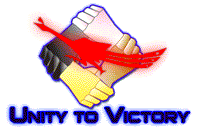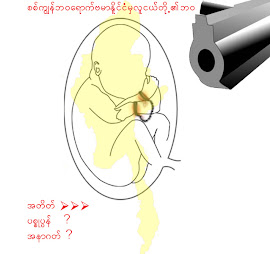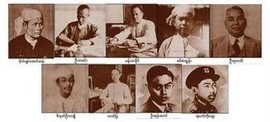သန္းေရႊ ထက္မိုက္သူ ဒီကမာၻမွာ မရွိႏိုင္ေတာ့ပါဘူး
Myanmar Rejects UN Call for Negotiations
YANGON, Myanmar (AP) — Myanmar's military junta rejected a U.N. statement calling for negotiations with the opposition, insisting Friday that it would follow its own plan to bring democracy to the country.
The impoverished country's main opposition party, however, urged the ruling generals to comply with U.N. demands for negotiations with pro-democracy forces and ethnic minorities, and the release of political prisoners.
State-run TV and radio issued a statement Friday arguing that conditions inside Myanmar — a reference to the anti-government protests that were violently suppressed by troops on Sept. 26 and 27 — were not the concern of the outside world.
"Myanmar's current situation does not affect regional and international stability," said the statement, attributed to Col. Thant Shin. "However, we deeply regret that the U.N. Security Council has issued a statement contrary to the people's desires."
"The government of Myanmar will continue to implement the seven-step roadmap together with the people," the statement said, referring to the junta's plan that promises a new constitution and an eventual transition to democratic rule.
The process is supposed to culminate in a general election at an unspecified date in the future. But so far only the first stage — drawing up guidelines for a new constitution — has been completed, and critics say the convention that drafted them was stage-managed by the military.
Top opposition party the National League for Democracy — led by the detained activist Aung San Suu Kyi — endorsed the Security Council statement.
"Since Myanmar is a member country of the United Nations and as the government has declared it would work with the U.N., we earnestly underscore the need to urgently implement the demands made by the Security Council," the NLD said.
The 15-member Security Council issued its first statement on Myanmar on Thursday in an attempt to pressure the military rulers — in charge of the isolated country since 1988 — to negotiate with the opposition and move toward democracy.
The fourth-ranking member of the junta, Prime Minister Gen. Soe Win, 59, died Friday in a military hospital after a long illness, relatives and state media said. Soe Win reputedly oversaw a 2003 attack on Suu Kyi from which she escaped unscathed.
His death, however, was unlikely to cause a ripple in the regime's grip on power. Soe Win had little if any influence in policy-making as prime minister.
The U.N.'s special envoy to Myanmar, Ibrahim Gambari, was due in the region this weekend "with a view to returning to Myanmar shortly thereafter," U.N. deputy spokeswoman Marie Okabe said. She gave no date for his trip to Yangon.
Gambari met with the junta's leaders earlier this month during a four-day trip to Myanmar after troops opened fire on peaceful protests in Yangon. U.N. Secretary-General Ban Ki-moon said after Gambari's visit that he could not call the trip "a success."
Myanmar's military junta has said 10 people were killed and nearly 2,100 arrested in last month's demonstrations, with 700 later released. Diplomats and dissidents say the death toll is likely much higher and up to 6,000 people were seized, including thousands of monks who led the rallies.
At least a dozen freed prisoners described brutal treatment at detention centers, including one who said "dozens" of detainees were killed, the Democratic Voice of Burma, a Norway-based short-wave radio station and Web site run by dissident journalists, said in a report Thursday.
There was no way to independently confirm the reports attributed to freed prisoners.
In an interview with The Associated Press, another released prisoner, Zaw Myint, 45, said he was arrested Sept. 26 on a Yangon street after a soldier bashed his face with the butt of his gun, leaving a bloody gash across his cheek.
Zaw Myint said he was denied treatment for three days then stitched up by a doctor at Yangon's notorious Insein prison, after the physician had treated several other wounded prisoners.
"He used the same needle to treat all patients. And I saw him give injections to wounded people using the same syringe," said Zaw Myint, who was released after a week in custody. He said was "extremely worried" about having contracted HIV as a result of the treatment. Rights groups say Myanmar's prisons have soaring rates of HIV-AIDS.
Human rights groups have long accused the military government of abuse and torture of prisoners. The Thailand-based Assistance Association for Political Prisoners, comprised of around 100 former inmates, has put out a report describing homosexual rape, electric shocks to the genitals, near drowning, burning with hot wax and other abuse.
Also Friday, Thai police said a bomb exploded in a guesthouse just across the border inside Myanmar, injuring two people. Col. Photsawat Tangchui, a police chief in the border district of Mae Sot in Tak province, said the blast hit the Shwebyisaya hotel, about 30 yards from the border.













12 comments:
They're insane. Look at how it's already affected the world. (Most of) the world is outraged as more and more comes into the light. This is an international issue and it's one of the most important- MORALITY. If the international community turns it's back on Burma that would be a moral crime, a crime to humanity everywhere. Dalai Lama recently spoke at Cornell University and reminded us all as humans we must take care of others as we take care of ourselves and that having that attitude itself brings inner strength. It's all of our responsibility!
http://cornellsun.com/node/23968
If we turn away, that will send a bad message for the future of all people.
Let's keep this going. The spread of information is the first step and its already working.
you know what? they became the leader of Burma, but they don't know what to do. What will soldiers know? They only know how to torture people and they don't have any understanding levels , they just give out orders, and the civilians there just have to act what they were ordered. Uneducated people are ruling the country. That's why the situation has become like this. At least , people now know that UN can't help us.
i disagree with you sandra. For example, pressure from the UN could get the flow of weapons to dry up.
UN could pressure the olympic counsel to pull the olympics from Beijing.
There are many things the UN can do.
Keep raising awareness.
Keep raising voices.
Keep hope alive!
Justice will prevail.
There are many things the U.N. can do but the question is will they do it? Burma is not important in the scheme of things because 98% of the U.S. don't even know where Burma is let alone what is going on there. So as you can see why Burma is on the bottom of the U.N. priority list. That is why it is up to the people of Burma to keep fighting and keep walking and keep voicing their concerns in the country to get more attention there....as Aung san Suu Kyi said "nothing in this world is free, everything has a cost. You can't expect democracy to be handed to you on a plate, you have to work for it, pay the price and fight for it". Burmese people will see the rest of the world will not and have not forgotten them. We will stand with them and that is why it is our responsibility as human beings to keep raising awareness and spreading the word and protesting and marching on their behalf. Let U.N. hear our cry for help to where they cannot turn away.
Love,
Sophie
sophielwin.blogspot.com
Arizona, USA
(Rangoon, Burma)
Thank you for the link headed to rissan. I agree with Carl, there are many things that the UN can do, and there are many things those of us on the outside world can do.
If, however, people think the UN or any other nation is going to storm into Burma guns blazing, then no, I can't see that's going to happen.
We are all responsible for the welfare of human rights. Adding our voices, our petitions and peaceful lobbying is the answer. It's working, not rapidly I know, but the pressure is building.
Happy to have found this blog! I have been writing about burma for some years now, and used to live at the thai-burma border.
To add to the discussion. I think the UN will not be the ones to solve the crisis in Burma, but at least they can scare the junta a bit.
More than that, on Monday the Europeen Union is deciding on sanctions. Please don't forget to send an e-mail to your foreign minister!!
Well, we have known it all along, haven't we. For over the last 40+ years, they just crush any one who talked and even thought about democracy. The UN must now know that they don't talk. Of course they don't. They are evils from hell. Even animals have more sense then the junta of Burma. The question is how to deal with the lowest of the low EVILS?
Can only read the English postings. Just to say Hi and let you know we are doing all we can in Edinburgh. Our school is linked with a Burmese Migrant Learning Centre (a school - except the Thai authorities don't like it called that!) see www.forthview.blogspot.com.
Many are wearing the safron ribbon described on the site. Big events next week with visit of Burmese Educationalist and meetings with top politicians in Edinburgh. The European Union meeting about Burma tomorrow is covered on Avaaz.org. Comment back on Forthview.blogspot if you want to make contact.
It is not the time to issue the statement deploring the Burmese regime's conduct.
Every word should be turned into action now.
http://burmabreakingnews.blogspot.com/
I am deeply concerned for those being detained in prisons and places alike. People were denied access to medical care and food. It is very disturbing to know the "doctor" inside prison is using the same syringe for many patients. Where are ethics gone? I hope ICRC could do effectively to help them.
Post a Comment